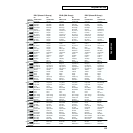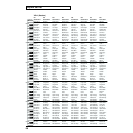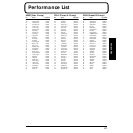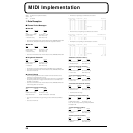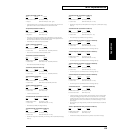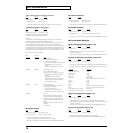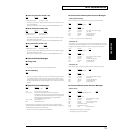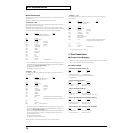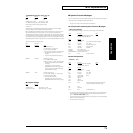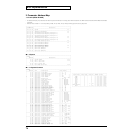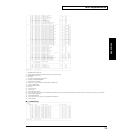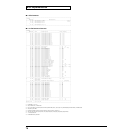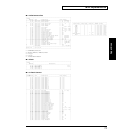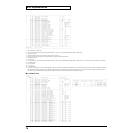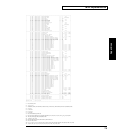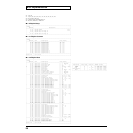
73
MIDI Implementation
Appendices
❍RPN MSB/LSB (Controller number 100, 101)
status 2nd byte 3rd byte
BnH 65H mmH
BnH 64H llH
n=MIDI channel number: 0H - FH (ch.1 - ch.16)
mm=MSB of the parameter number specified by RPN
ll=LSB of the parameter number specified by RPN
<<< RPN >>>
Control Changes include RPN (Registered Parameter Numbers), which are extended
parameters whose function is defined in the MIDI specification.
When using RPNs, first the RPN (Controller numbers 100 and 101; they can be sent in any
order) is transmitted to specify the parameter you wish to control. Then, Data Entry
messages (Controller numbers 6 and 38) are used to set the value of the specified parameter.
Once a RPN parameter has been specified, all further Data Entry messages on that channel
are considered to apply to that specified parameter. In order to prevent accidents, when the
desired setting has been made for the parameter, it is recommended that RPN be set to Null.
This device transmits the following RPNs.
RPN Data entry
MSB LSB
MSB LSB Notes
00H 00H mmH - Pitch Bend Sensitivity
mm: 00H - 0CH (0 - 12 semitones)
ll: ignored (processed as 00H)
Up to 1 octave can be specified in semitone steps.
* The Bend Range Up/Down will also be
changed.
* Not received by the Rhythm Part (Part 10).
00H 01H mmH llH Channel Fine Tuning
mm, ll: 20 00H - 40 00H - 60 00H
(-4096 x 100 / 8192 - 0 - +4096 x 100 / 8192 cent)
* In Patch mode, the Master Tune (SYSTEM)
will change.
* In Performance mode, the Fine Tune
(PERFORM) of each Part will change. When
received on the Control channel, the Master
Tune (SYSTEM) will change.
00H 02H mmH - Channel Coarse Tuning
mm: 10H - 40H - 70H (-48 - 0 - +48 semitones)
ll: ignored (processed as 00H)
* Not received in Patch mode.
* In Performance mode, the Coarse Tune
(PERFORM/PART) of each Part will change.
● Program Change
status 2nd byte
CnH ppH
n=MIDI channel: 0H - FH (ch.1 - ch.16)
pp=Program number: 00H - 7FH (prog.1 - prog.128)
■ System Exclusive Messages
There is a kind of the Universal Non-realtime messages and the Data Set (DT1) messages in
the System Exclusive messages transmitted by this device.
* The device ID number of this instrument is fixed at 10H (17).
● Universal Non-realtime System Exclusive Messages
❍Identity Reply Message
When Identity Request message (p. 71) is received, this message will be transmitted.
status data byte status
F0H 7EH, dev, 06H, 02H, 41H, 6AH, 00H, F7H
05H, 00H, 00H, 00H, 00H, 00H
Byte
Remarks
F0H Exclusive status
7EH ID number (Universal Non-realtime message)
dev device ID (dev: 10H)
06H sub ID#1 (General Information)
02H sub ID#2 (Identity Reply)
41H ID number (Roland)
6AH 00H Device family code
05H 00H Device family number code
00H 00H 00H 00H Software revision level
F7H EOX (End Of Exclusive)
● Data Transmission
❍Data Set1 DT1
status data byte status
F0H 41H, dev, 6AH, 12H, aaH, bbH, F7H
ccH, ddH, eeH, ... ffH, sum
Byte
Remarks
F0H Exclusive status
41H ID number (Roland)
dev device ID (dev: 10H)
6AH model ID (JV-1010)
12H command ID (DT1)
aaH address MSB
bbH address
ccH address
ddH address LSB
eeH data: The actual data to be transmitted. Multi-byte
data is transmitted in the address order.
::
ffH data
sum checksum
F7H EOX (End Of Exclusive)
* The amount of data transmitted at one time is fixed for the type of data, and the data will
be transmitted with the fixed starting address and size. Refer to the address and size
given in “Parameter Address Map” (p. 74).
* Large amounts of data must be divided into packets of 128 bytes or less, and transmitted
at intervals of approximately 20 ms.
* For the checksum, refer to (p. 86).



